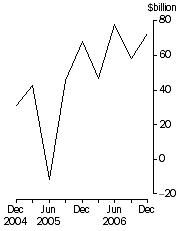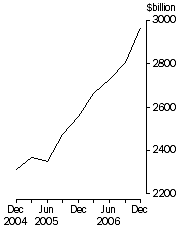DECEMBER KEY FIGURES
 |  | Credit market
outstandings
at end | Demand for
credit
during | Other
changes
during | Credit market
outstandings
at end |
 |  | Sep Qtr 2006 | Dec Qtr 2006 | Dec Qtr 2006 | Dec Qtr 2006 |
Non-financial domestic sectors | $b | $b | $b | $b |
|
| Non-financial corporations |  |  |  |  |
 | Private | 1 577.4 | 37.2 | 86.4 | 1 701.0 |
 | National public | 38.5 | 16.0 | 4.6 | 59.1 |
 | State and local public | 47.8 | 1.6 | -0.1 | 49.3 |
| General government |  |  |  |  |
 | National | 65.2 | -5.8 | 0.1 | 59.5 |
 | State and local | 34.3 | -1.4 | 0.0 | 32.9 |
| Households | 1 040.8 | 24.6 | 1.7 | 1 067.1 |
| Total | 2 804.0 | 72.1 | 92.7 | 2 968.9 |
|
Total demand for credit

| Credit market outstandings

|
DECEMBER KEY POINTS
SUMMARY
- Total demand for credit by the non-financial domestic sectors for the December quarter 2006 was $72.1b, an increase of $14.2b on the previous quarter estimate.
NON-FINANCIAL CORPORATIONS
- Private non-financial corporations raised a net $37.2b (up $8.5b), with loans of $17.2b (up $12.0b) and share raisings of $12.3b (up $2.0b).
- National public non-financial corporations showed raisings of $16.0b in December 2006.This mainly reflects the equity market impacts of the privatisation of a national public non financial corporation (see note on page 2).
GENERAL GOVERNMENT
- National general government reduced their liabilities to the market during the December quarter by a net $5.8b, driven by bonds worth $5.9b maturing during the quarter. State and local general government also reduced their market liabilities during the quarter by a net $1.4b through the repayment of loans.
HOUSEHOLDS
- Households raised a net $24.6b during the December quarter 2006, down from the September quarter estimate of $25.5b. Households borrowed $23.5b from banks (of which $12.9b was for owner-occupied housing and $4.2b for investment housing) and $1.2b from Financial intermediaries n.e.c.
NOTES
FORTHCOMING ISSUES
| ISSUE (QUARTER) | Release Date |
| March 2007 | 29 June 2007 |
CHANGES TO THIS ISSUE
There are no changes in this issue.
SIGNIFICANT EVENTS
During the December quarter 2006, the national general government completed its sale of the Telstra Corporation Limited with the Telstra 3 share offer (T3). T3 investors were issued with a security known as an instalment receipt. Until payment of the final instalment, the shares will be held in trust with Telstra Sale Company Ltd being the trustee. The ABS considers that the trust established to hold the Telstra shares until the final instalment payment in May 2008, be recognised as a statistical unit in its own right, and classified to the financial intermediary n.e.c. subsector. While ABS statistics will apply the change from public to private sector of Telstra from the March quarter 2007, the impacts that arise from the issuance of the instalment receipts by the trust which are traded separately from Telstra shares are reflected in this issue of the Australian National Accounts, Financial Accounts. For more information please see ABS Information Paper 'Future Treatment of Telstra in ABS Statistics, 2007' (cat. no. 8102.0) released on 26 February 2007.
Due to the privatisation of Telstra, users are cautioned to take care in interpreting the aggregates presented in Table 1 and Table 17 of this publication. These tables present a liabilities view only of the non-financial domestic sectors, and as such do not include the offsetting asset entries.
REVISIONS IN THIS ISSUE
There have been revisions to previously published aggregates through:
- quality assurance work undertaken with providers of the ABS Survey of Financial Information, ABS Survey of International Investment and APRA administration data sets, these resulted in revisions back to September 2004
- reclassification of assets due to reporting changes by several registered financial corporations, this has resulted in breaks in series to currency assets and liabilities and loan assets of other depository corporations.
INQUIRIES
For further information about these and related statistics, contact the National Information and Referral Service on 1300 135 070 or Terry Rawnsley on Canberra (02) 6252 6711.
 Print Page
Print Page
 Print All
Print All